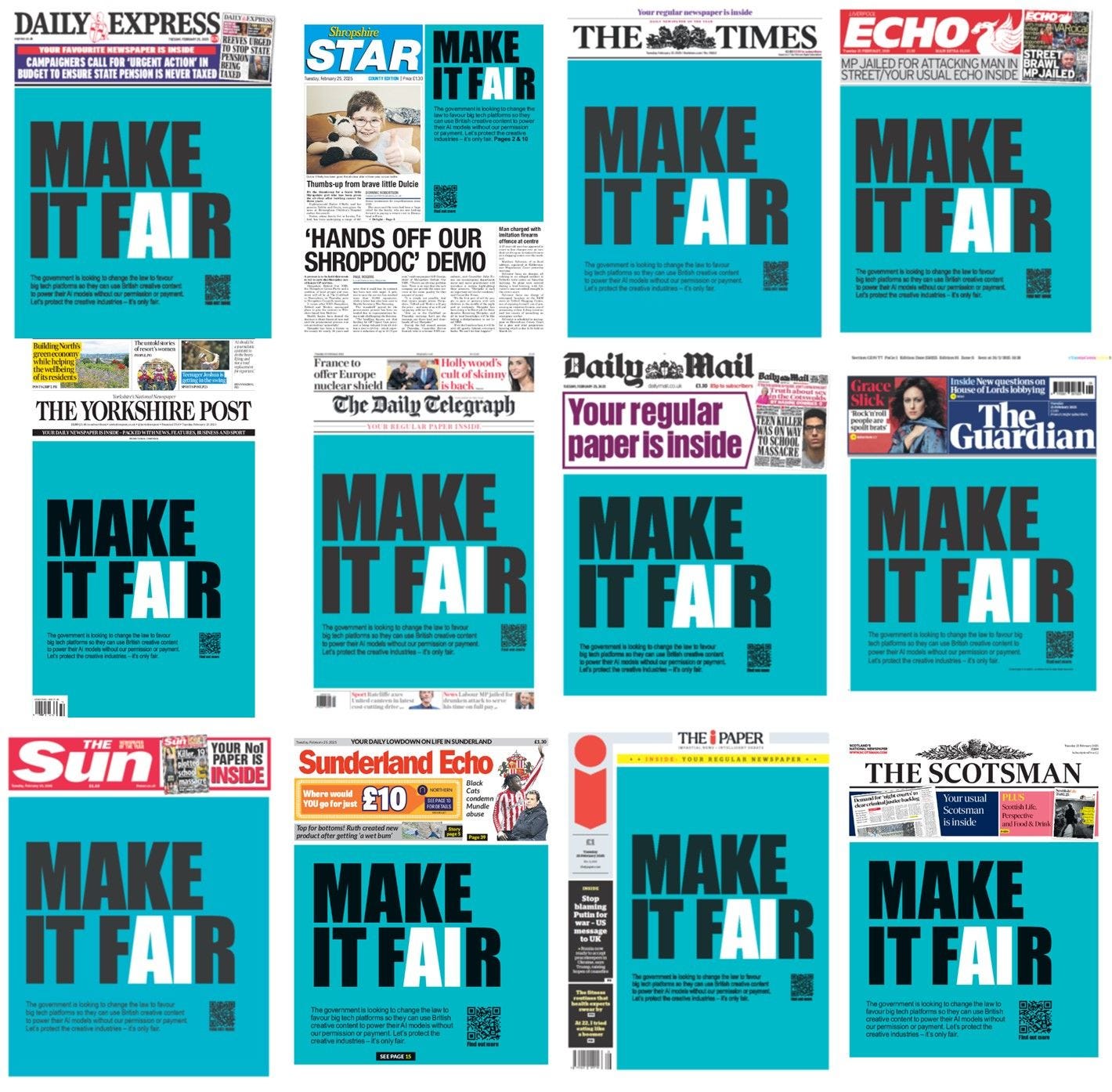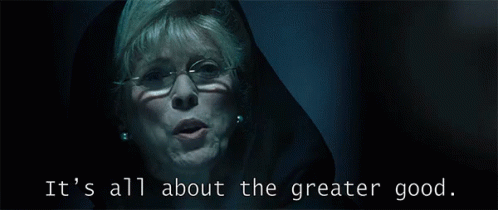✊ The Week Creatives Fought Back Against AI Theft
How British newspapers, musicians and TV channels combined forces against the broligarchy
As the closing credits began to roll on 2024, astonishingly a much saner year than this is turning out to be, I wrote an optimistic post opining that ‘2024 is nearly over but the revolution is just beginning’. Well, this week the revolution stepped up a gear, in the UK at least.
What revolution am I talking about exactly? Back in the chilly depths of December 2024 I described it as a revolution against “morally corrupt corporations that exploit people and planet for profit”, in the manner of fictional outfits such as BiffCo, the Tyrrell Corporation or the Weyland-Yutano Corporation (sci-fi fans will know).
Back then the revolutionary rumblings were subtle; quiet quitting, rising populism (in response to perceived ineffectiveness of incumbent politics), joblessness as a choice. Then Luigi Mangione fired the literal opening shot of a more overt rebellion in the US. I do not condone his actions in any way shape or form, he didn’t just murder the CEO of an, arguably, corrupt health insurer but also a husband and father of two. However, the outpourings online suggest there were many who understood his reasons, even if they didn’t condone them either.
This week in the UK we saw the opening of a much more positive front in the war against the techno-feudalists who feel entitled to our creativity at no cost. For the first time in British newspaper history - which stretches back some 300-odd years - every major newspaper in the UK carried the same front page supporting the News Media Association’s ‘Make It Fair’ Campaign, which asks:
AI is profiting from human creativity – isn’t it time creators got their fair share?
The campaign was launched on 25th February, the last day of the British government’s consultation into plans to change laws in favour of big tech platforms; allowing them to use British creative content to power their AI models without permission or payment, upending centuries of copyright protections.
What I can’t understand is; if, as OpenAI CEO Sam Altman has stated, "AI will generate enough wealth to pay each adult $13,500 a year”, why the fuck are they pleading poverty when it comes to paying creatives and copyright holders?
Either ‘Big AI’ don’t believe their own claims or they are outright lying about them. They don’t even need to pay creators up front; if AI is going to create that much wealth in the future then give every creator and copyright owner a slice of the action, fractions of a percent will do based on some of the more outlandish claims around its money-making potential.
Also, content is not the only thing AI needs to succeed, it needs compute power so why don’t they ask Nvidia to supply chips for free? It needs electricity and water but I’ve heard nothing about them refusing to pay their bills or asking for an exemption in the interest of the greater good. As usual it’s only the creatives who are expected to work for nothing!
It wasn’t just newspapers pushing back this week either, the music industry (which already sold its soul to Spotify but hey ho), paired up with the News Media Association to launch their protest too.
One thousand musicians including the likes of Annie Lennox, Damon Albarn and Kate Bush released an album featuring the sounds of empty recording studios titled ‘Is This What We Want?’ whose 12 track titles spell out: The British Government Must Not Legalise Music Theft To Benefit AI Companies. British broadcasters BBC, ITV, ITN, Channel 4, and Sky also added their voices to the growing chorus by buddying up via independent trade body PACT to call on government to safeguard the UKs creative assets from automatic inclusion in GenAI models.
So, is any of this activity having an impact? YES! The UK Intellectual Property Office has received over 4,000 responses to its consultation which, ironically, they are rumoured to be summarising with AI!
This overwhelming reaction prompted Chi Onwurah MP & Chair of the Science, Innovation and Technology Committee and Dame Caroline Dinenage MP & Chair of the Culture, Media and Sport Committee to pen a joint letter to their respective Secretaries of State proposing the following:
The government should introduce practical measures to provide transparency on AI training data, whatever its approach to copyright law
The government’s preferred option should not be taken forward without a technical solution that works, is implementable and accessible to all
The government should publish a full impact assessment for each option set out in the consultation
Robust mechanisms are needed to enforce compliance, enforcement and redress.
A response from the government was expected by Tuesday 18th March but just yesterday The Times reported that, “Sir Keir Starmer has played down plans to allow artificial intelligence companies to scrape material on the internet by musicians, authors and artists without their permission, insisting that he wants the creative industries to thrive.”
This is an incredibly positive result and proves that getting organised and speaking with one voice is far more powerful that getting angry and speaking with a lone gun. Democracy may be slow but it can and does work and we must all get more involved.
N.B. Credit where it’s due; if you are looking for more frequent updates and detailed analysis on this story I cannot recommend the Substack by
highly enough. Thanks, as ever, for your diligent reporting Graham.To Do List
My recommendations for new things to read, watch, look at, listen to and do:
More stories have emerged about how AI is being used dehumanize workers (I’ll have a podcast coming on this soon), this is the latest must-read from 404 Media: Y Combinator Supports AI Startup Dehumanizing Factory Workers.
As much as I try to keep my arguments rational I am a sucker for a good government conspiracy thriller and I really enjoyed the new Netflix mini-series Zero Day starring Robert De Niro and the luminous Lizzy Kaplan.
As part of his promo rounds De Niro dropped into GQ to look back on his entire body of work, one of the most expansive interviews by the famously reticent legend:
I’m giving you plenty of warning for this; from 12-13 April at Gilman Barracks promoter NeonPulse is putting on the ultimate celebration of 40 years of Singaporean counterculture with the Big O festival; a celebration of Singapore’s best indie and alternative bands from the 80s to now. Book tickets at https://theneonpulse.com and tweak your nostalgia nerve with this comprehensive playlist in advance of the event:
Right, that’ll do ya! Cheers, Nx








Saying that, the concept of copyright makes little sense in a world where copies can be instantly and freely made and distributed. And it also doesn’t really fit the way creativity happens. Your new song was written not only by you, but also by the rest of the band who workshopped it with you, and was composed out of a grain-thin layer of your new ideas sprinkled on top of a massive and ancient cultural product written by thousands of people over thousands of years. Which ones “catch” and which ones don’t is more to do with luck than anything else. It’s not fair that Eric Clapton got all the money when his art was build out of blues standards evolved by generations of African Americans.
This is exacerbated by the fact that throughout the whole of human history people have wanted art more than they have been willing to pay for it. People nowadays don’t see why they should pay for popular music; apart from a brief window from 1960-1995, they never have. Until it as taken from us by the music industry, music was a normal human behaviour like speaking. The idea that every copy of an idea must be paid for is not inherent or inevitable. Given that ideas are freely copied between our minds, it’s actually inherently unnatural.
The early Jamaican music industry had a better economic model, based on dubplate. In dubplate, records were recorded direct to a vinyl master, which was never reproduced. The original was owned by the sound system which had commissioned it. If a different sound system wanted to play the same record they had to pay the band to record it again. This meant that musicians were basically paid a fair rate up front for a day’s work, no banking it all on hopes of millions of people buying the record, so no being cheated out of your royalties.
You agree a fee up front that you’re happy with. You get the money, and don’t owe anyone the repayment of an advance. If your work does well, next time you can negotiate a higher fee. You’re not on the hook for a five album deal; you’re not constrained to do what the label tell you; more music gets recorded; there is a more direct connection between artists, audiences, technicians and industry; more plurality, and as we can see from the case of Jamaican music, a massive acceleration in development, both aesthetic and technological; and you cannot be defrauded.
Creates fewer million- or billionaires; supports a much wider industry.
I think it’s time to ditch copyright. It is breaking anyway. Get paid for your day’s work, then release your product into the world.
Altman: "AI will generate enough wealth to pay each adult $13,500 a year." This bullshit claim implies that AI will produce some kind of universal basic income for "each adult," which is of course nonsense. The windfall will go directly into tech bro pockets.